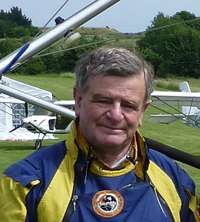Brian Milton
| Brian Milton | |
|---|---|
 | |
| Born |
17 September 1942 Hitchen, Hertfordshire, United Kingdom |
| Occupation | Journalist and adventurer |
| Website | www.brian-milton.com |
Brian Milton is a British journalist and adventurer who made the first circumnavigation of the world in an ultralight aircraft in 1998, taking 120 days. His first major expedition took place in 1968 when he drove a 1937 Austin 7 Ruby across the Sahara Desert to meet his fiancée.
Milton has won multiple awards as an ultralight (microlight) and hang-glider pilot. His interest in microlights grew from a love of hang-gliding (he was the Founder of the British National League in 1976 from the top 54 hang glider pilots in the UK). In October 1978 at Chattanooga, Tennessee, Milton captained the British hang-gliding team to victory in the America Cup. The following month he planned another feat: to fly across the English Channel to Paris in one of the first motorized gliders. On 13 November 1978, he was practicing in the prototype over Dorset, England. At a height of 250 feet, the wings of the glider collapsed and Milton, unable to open his parachute in time, plummeted to the ground. Miraculously, he survived with severe bruising and some broken bones. The story of Milton's brush with death was covered on the BBC Nine O'Clock News that evening, where newscaster Angela Ripon described Milton as "the luckiest man alive."[1]
His flight in the Dalgety Flyer (a Shadow 3-axis microlight) in 1987 from London to Sydney in 59 days was, at the time, the longest microlight flight in history but he is better known for his adventure in 1998 when he made the first circumnavigation of the world in the Global Flyer - a Pegasus Quantum (912) weightshift flexwing ultralight (microlight) trike - travelling 24,000 miles in 120 days, at the time the Guinness World Record for the fastest ultralight or microlight circumnavigation. Chris Bonington devoted a chapter to this feat in his book Quest for Adventure: Remarkable Feats of Exploration and Adventure 1950-2000. Bonnington described Milton's flight around the world as "an amazing achievement, of dogged bloody-minded tenacity and the taking of some huge risks.." [2]
In 2001 Milton attempted to cross the Atlantic non-stop in a Mainair Blade (912) weight shift microlight fitted with a massive 438 litre fuel tank - an adventure that didn't quite go as planned.
In 23 May 2009 issue of the UK newspaper The Daily Telegraph, Milton was named as one of the "Top 20 great British adventurers" still living.[3]
Awards and achievements
- Prince of Wales Trophy – Royal Aero Club (RAeC) – from HRH Prince Charles in 1979 for leading the British hang gliding team to victory in the First American Cup Meet in the USA.
- BHGA National Trophy – RAeC – from HM The Queen in 1985, for his outstanding services to British hang gliding in its first 10 years.
- 1987 - At the time the longest ultralight (microlight) flight in history, from London to Sydney - 59 days - in the Dalgety Flyer (a Shadow 3-axis microlight).
- Guinness World Record in 1998 for first and fastest ultralight circumnavigation of the world in the Global Flyer - a Pegasus Quantum (912) weightshift microlight - travelling 24,000 miles in 120 days.
- Diamond Colibri Award in 1998 for first ultralight flight around the world. Milton was one of the first 3 Britons to win this award.
- Segrave Trophy – Royal Automobile Club (RAC) – from HRH Prince Michael of Kent in 1999 for the first microlight flight around the world in 1998.
- Britannia Trophy – RAeC – presented by HRH Prince Andrew in 1999 for the first microlight flight around the world.
- FLYER Magazine gave Milton the ‘Flight of the Year’ award in 2000.
- Norton-Griffiths Trophy – RAeC – from Prince Michael of Kent in 2009 for Milton's co-pilot role to blind adventurer Miles Hilton-Barber flying a microlight from England to Australia.
Works
- Dalgety Flyer (1990) – Bloomsbury – ISBN 0 7475 0599 3. Account of a microlight flight to Australia in 1987/8, despite being wrecked in Greece, and falling into the Persian Gulf on Christmas Day 1987 during the Iran/Iraq War.
- Global Flyer (1998) – Mainstream – ISBN 1 84018 129 X. Milton’s 1998 first round the world flight by microlight. Led to A Microlight Odyssey on National Geographic TV.
- Chasing Ghosts (2002) – NEP Travel – ISBN 1 8724102-3-5. Milton’s story of the failed attempt at the Atlantic by microlight in 2001. Featured as Escape by Microlight on National Geographic TV.
- Alexa: The Life and Death of an Austin 7 Ruby (2009) – Burning Daylight Publications – ISBN 978 0 9555452 1 4. About a drive in a 1937 Austin 7 from London across the Sahara Desert and the Congo in 1968-69 to marry a girl at the other end of Africa.
- Lancaster: The Biography (2009) – Andre Deutche – ISBN 978 0 233 00270 5. History of the famous Lancaster bomber co-written with Dambuster Squadron pilot Tony Iveson DFC.
- Hurricane: The Last Witnesses (2010) – Andre Deutsche – ISBN 978 0 233 00296 5. Story of the Hawker Hurricane in WWII.
References
- ↑ Ripon, Angela (13 November 1978). "The Luckiest Man Alive". BBC Nine O'Clock News.
- ↑ Bonnington, Chris (2000). Quest for Adventure: Remarkable Feats of Exploration and Adventure 1950-2000. London: Cassell & Co. pp. 308–21. ISBN 0 304 35418 X.
- ↑ Cooper, Tarquin (23 May 2009). "Top 20 great British adventurers". The Daily Telegraph. p. W5.